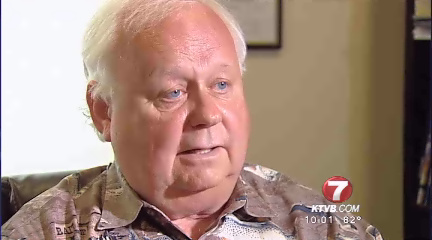BOISE -- The foreman of the jury that convicted Daniel Ehrlick of the first degree murder of 8-year-old Robert Manwill explains how they reached a verdict in just over two hours.
I thought it was going to be easier than it was. It was an emotionally draining trial, jury foreman George Tway said.
He explained it was tough to hear some of the information and see some evidence, but said the result was justice.
It was a very emotional experience. The little boy that's killed, and having to deal with that, and it was a brutal murder, and so it was difficult to hear all the facts and look at the pictures, but we needed to find justice, Tway said.
Inside the jury room
Tway gives a lot of credit to the way all of the jurors, including the alternates who weren't a part of the deliberation, took notes and really paid attention during the trial.
I was really impressed with all 15 jurors, Tway said. There was a group of people that worked very, very hard. There wasn't one person you felt wasn't taking notes, wasn't keeping up, wasn't really involved in the trial. It was really an honor to serve with all those folks.
Tway says each juror filled up several yellow legal pads of notes and would privately review their notes daily. So, he explained once the jury began deliberating, everyone had a good handle on the case.
We did listen to a portion of one tape. We did read portions of some of the transcripts from some of the tapes. We looked at some of the pictures. We looked at some of the evidence that was there. But we didn't need to re-try the whole thing because we did have all the notes, and we did know what the evidence was, Tway said.
Tway says they took a vote by secret ballot to reach the unanimous verdict.
'It was very obvious that he was guilty'
The trial lasted 28 days and spanned seven weeks. Out of those many days, here's what Tway said stands out:
I think the testimony about Robert and what an energetic, fun-loving boy he was had to really stick out, Tway said. And then of course, the interviews that Daniel Ehrlick had with the FBI and with the police department certainly were very important in the evidence we saw.
Ehrlick's own comments to officers and on the stand, Tway says, are what lead to his guilty vote.
For me, and I can only speak for me, it had to be, you know, his own words or his own testimony on the stand and his interviews with the officers. He contradicted himself. He had lied to Health and Welfare. He didn't have a straight story on what happened. So it was very obvious that he was guilty, Tway said.
Tway added, Ehrlick would have been found guilty without testifying.
I don't think his taking the stand... We were surprised he did, but I don't know that his taking the stand made too much of a difference, Tway said. We had heard all of that same testimony or evidence when he did the interviews with the police and FBI, and he didn't change that story too much. It was pretty obvious that he wasn't a credible witness.
Jurors thought Melissa Jenkins would testify
With several motions filed, it appeared Robert's mother Melissa Jenkins might testify about her role in her son's death. She pleaded guilty to aiding and abetting Robert's murder. The jury never heard that information though, as the state did not call Jenkins.
Listening to the evidence as it came in, you kind of thought that you would hear from Melissa Jenkins. I think some people on the jury knew that Melissa had pled guilty to it, some people didn't. But I think we all expected that she would probably take the stand, Tway said.
While they may have expected her testimony, Tway says it didn't really matter that she never took the stand.
I don't think it made any difference whatsoever, and I think that's probably why she didn't take the stand because I don't think it made a bit of difference, Tway said.
Proof beyond a reasonable doubt
Ehrlick's attorney Gus Cahill called it a lack of proof case from the beginning. During his closing argument, Cahill asked the jurors to seriously consider their decisions, making sure they could face themselves long after the verdict.
Tway says after they'd taken a vote in the jury room, they discussed if each felt good about their decision. He says they all absolutely felt comfortable.
We all agreed that yes, he's guilty beyond a reasonable doubt, and we can look ourselves in the mirror and know that we made the right decision, Tway said.
A local jury: What they knew going in
The jury foreman says he was living in Nevada when the search for Robert was going on in 2009, but he knew a little about the case going in. Tway's wife had helped search for Robert, and he knew Ehrlick had been arrested. Those were things he put on his 55-page questionnaire potential jurors answered before being selected.
One of the questions was, do you have any inkling that he may be guilty? I mean, you have to be honest, he was arrested, so I mean you kind of start with that knowing that he was arrested, but you still have to look at the evidence and see if in fact he was guilty.
Despite some having prior knowledge, Tway says he and the other jurors were able to put aside that information and look at the case piece by piece, as presented in court.
'Without a doubt, it's our duty'
Tway said while taking time out of his life was emotionally draining, he knew serving was important.
It was tough for the jury to sit through the trial, but I mean, nothing compared to what it had to have been for Charles Manwill [Robert's father] to sit through that trial, I mean, it had to have been really hard on him, Tway said.
Tway also owns a new travel agency and admits the seven week trial made keeping up with his work difficult. But again, he encourages anyone called for jury duty to take it seriously and try to serve if at all possible.
Without a doubt it's our duty to do that, Tway said. I mean, you and I would not want to be on trial with a bunch of people that just volunteered, just love to be on jury duty. We would want to be tried by people who were our peers and who take their duty seriously to serve, so I think if you're called for jury duty, it's something you need to do if you possibly can.
Ehrlick will be sentenced by a judge on Sept. 2. He faces a maximum of life in prison without parole. Melissa Jenkins, Robert's mother, will be sentenced for her role next month.


